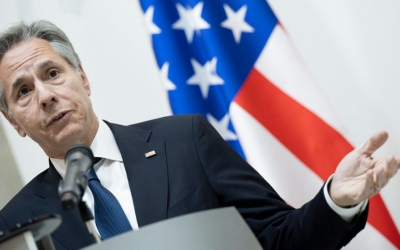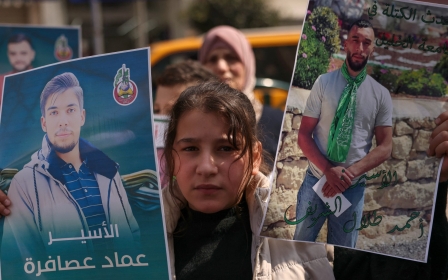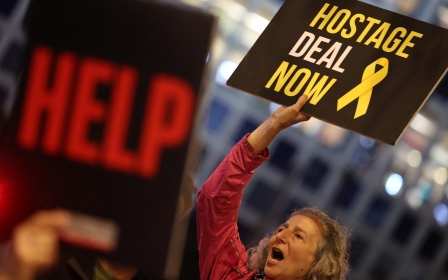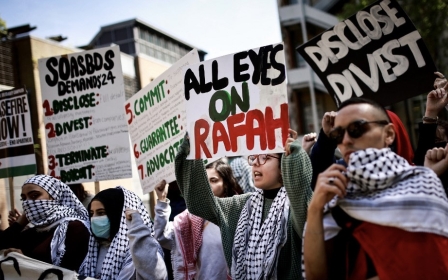War on Gaza: Israel's increasing savagery against Palestinians is a sign of its defeat

Four recent developments on the international scene will likely lead to the cornering of Israel and the removal of the false mask it has always displayed to the world.
The first of those developments has been the protests by university students in the US and around the world. The second is the issuing of arrest warrants by the International Criminal Court (ICC) against Israeli Prime Minister Benjamin Netanyahu and his defence minister, Yoav Gallant. The third, the recognition of the Palestinian state by Spain, Ireland and Norway. And, finally, the International Court of Justice (ICJ) ordering Israel to halt its assault on Rafah last Friday.
These developments only constitute the tip of the iceberg in the deterioration of Israel’s false narrative as a "democratic state" which is defending itself against Palestinian "terrorism".
The extremist Israeli government is compensating for this political and military loss by intensifying retaliatory crimes against civilians in Gaza, imposing land grabs, and implementing further aggressive, illegal and pre-planned punitive measures to create facts on the ground; mainly by expanding existing settlements, building new ones, and undermining the Palestinian Authority in the West Bank that undermine any possibility of the establishment of a Palestinian state.
The most recent of those retaliatory crimes was the Rafah massacre on the evening of 26 May, when rockets fired by the Israeli army at the tents of displaced Palestinians sheltering in a UN-run "safe zone" led to the burning to death of at least 40 refugees, most of them women and children.
New MEE newsletter: Jerusalem Dispatch
Sign up to get the latest insights and analysis on Israel-Palestine, alongside Turkey Unpacked and other MEE newsletters
Although Israel sent its “retaliatory threats” to the ICC, the ICJ and the three European countries that recognised the state of Palestine, and incinerated civilians in the Gaza Strip, a large number of these threats also went to the occupied West Bank and the Palestinian Authority (PA).
For we, the Palestinians of the West Bank, are in the eye of the Israeli retaliatory storm.
'Punitive measures'
Israeli Finance Minister Bezalel Smotrich on 22 May called for “harsh punitive measures'' against the PA.
Those punitive measures would include isolating Palestinian banks by not extending guarantees to Israeli banks that deal with them against potential litigations; the cutting off of tax revenues to the PA; promoting the construction of tens of thousands of housing units in the West Bank; establishing a new settlement "for every country that unilaterally recognises a Palestinian state"; and cancelling the Norwegian arrangement whereby Norway would serve as an intermediary for holding tax revenues that Israel has withheld from the PA since the beginning of the war.
Follow Middle East Eye's live coverage of the Israel-Palestine war
The US Treasury Secretary Janet Yellen and G7 officials from Canada, France, Germany, Italy, Japan, the UK and the US expressed deep concerns about the threats to isolate Palestinian banks, a move that would close a critical lifeline for the Palestinian economy.
On 22 May, Gallant revoked the 2005 Israeli "disengagement law" for the northern West Bank.
The law, put forward by then Prime Minister Ariel Sharon, stipulated Israel’s withdrawal from the Gaza Strip and included the evacuation of four settlements in the West Bank. Following Gallant's intervention, Israeli settlers will now be allowed back to those evacuated settlements.
On the same day, the Israeli Knesset passed a preliminary reading of a bill that would annex the occupied southern Hebron Hills to the Israeli Naqab region.
These threats against Palestinians demonstrate the arrogance and insolence of Israel, which acts as a state above international law and infringes upon sovereign states and their right to make sovereign decisions.
Israel has always attacked any party that opposes or criticises its policies, whether an individual, state or institution, with accusations of antisemitism.
In this extreme position, Israel is counting on the support of its largest ally, the United States, and other countries such as the United Kingdom, the only two nations - apart from Israel, of course - that opposed the decision of the ICC.
These “punitive measures'' are part of a plan prepared in advance within the strategic vision of this and previous Israeli governments, and aim to make reaching a peace agreement and establishing a Palestinian state impossible from a practical standpoint.
Growing international consensus
These measures are connected to actions taken by Israel long before the 7 October 2023 attack.
The decision to restore settlements in the northern West Bank, for example, was made in March 2023. The decision to stop tax revenue from being transferred to the PA on 23 October, a couple of weeks after the 7 October attack.
Israel stopped transferring funds to PA coffers several times before in 2014 in retaliation against the PA intention to join the International Criminal Court (ICC) and in 2022 when the Israeli cabinet stopped the transfer of $176m of tax revenues to the PA.
Also, the expansion and construction of settlements has continued in the West Bank under all Israeli governments, whether right or left.
This is something that we residents of the occupied West Bank witness daily.
Over the past two decades, successive Israeli governments have sought to weaken the PA and thwart its efforts to transform into a Palestinian state, as stipulated in the Oslo Accords of 1993, which stipulated the establishment of a Palestinian state within five years, specifically by May 1999 at the latest.
Even the disengagement law adopted by Sharon in 2005 was not part of a plan or political vision for separation from the Palestinians, but rather came from a purely security consideration, and took place without consultation with the PA.
Since Palestine joined the United Nations as a non-member observer state in 2012, and subsequently joined the ICC in 2015, Israel has taken ever-more harsh actions to undermine the PA's authority.
The step-by-step gains the Palestinians are achieving are very important towards reaching the goal of ending the occupation. It is a case of repeated punches, instead of a single knockout blow
It started reducing its autonomous role as stipulated in the Oslo Accords. Indeed, Israel is no longer even committed to the provisions of the accords, with the implementation of its provisions having become optional and selective in order to serve Israel's interests only.
Many Palestinians now think that a recognition of the Palestinian state would be insufficient to stop the genocide and end the occupation. They see it as a political manoeuvre to pacify public outrage and divert it from focusing on measures that could be truly effective, such as stopping arms exports to Israel, boycotting it politically, economically and militarily, and cutting diplomatic ties with it.
This a valid argument, but at the same time I see that the step-by-step gains the Palestinians are achieving are very important towards reaching the goal of ending the occupation and getting justice. It is a case of repeated punches, instead of a single knockout blow.
Israel, backed by the US, is in denial about the new reality taking shape in the world, which is increasingly mobilising against the occupation and the culture of impunity.
International public opinion is now more than ever aware of the need to stop the genocide, end the occupation and give the Palestinians their legitimate rights to freedom and self-determination.
We hope that this growing international consensus will form a global tsunami that will sweep away the Israeli occupation and bring justice and dignity to the people of Palestine, suffering under the longest colonial military occupation of the modern era.
The views expressed in this article belong to the author and do not necessarily reflect the editorial policy of Middle East Eye.
This article is available in French on Middle East Eye French edition.
Middle East Eye delivers independent and unrivalled coverage and analysis of the Middle East, North Africa and beyond. To learn more about republishing this content and the associated fees, please fill out this form. More about MEE can be found here.






